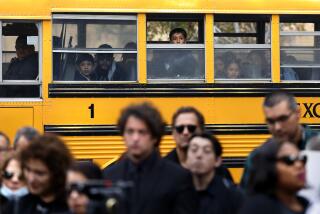Do These Major Executives Act More Like Minors?
- Share via
Consider the spectacle of Microsoft Corp. Chairman Bill Gates--the world’s wealthiest person and arguably the most successful entrepreneur in history--behaving like an obfuscating adolescent in videotaped testimony in the company’s antitrust trial.
And think about Walt Disney Co. Chief Executive Michael Eisner, acknowledging in court that he might once have disparaged former studio chief Jeffrey Katzenberg as a “midget” and described him as “my retriever” and the “end of my [cheerleader] pompom.”
These are the mature executives of corporate America?
Accustomed to instant gratification, many bosses rule with an unpredictable hand, demanding total control, fierce loyalty and spectacular financial results, often at the expense of underlings’ personal lives.
Granted, many of them have built tremendously prosperous companies. But what sorts of leaders are these individuals? Can somebody who smart-mouths like an insecure teenager be a good captain of industry? Can an immature leader grow up on the job?
Here’s some curbside psychoanalysis of a few top dogs, courtesy of a trio of longtime researchers into the executive psyche.
John F. Welch, chairman and CEO of General Electric Co.: Years ago, Welch earned the nickname “Neutron Jack” because he was notorious for being bombastic and shaking up the organization.
“Somebody could have looked at his earlier style and said: ‘That’s very immature,’ ” said Jerry Porras, a professor of organizational behavior and change at Stanford University and coauthor of “Built to Last.” “But he has built a stronger GE.” At company seminars, he spends his time challenging managers and building their leadership capabilities, a sign of maturity.
Welch, 63, came of age in another era, and some might question whether managers over 55 can ever fully grasp the implications of the Internet, said Warren Bennis, a professor at USC’s Marshall School of Business and author of many books on leadership. “But Welch is an incredibly strategic thinker, part of the grown-up group.”
Steve Jobs, interim chief executive, Apple Computer Inc.: In his first go-round at the company he co-founded, Jobs spent his time being a guru instead of building a lasting organization. As it was headed down the tubes, he rode to the rescue. Jobs, 44, has learned a few lessons and behaves less like a show-boating, impetuous kid. He could demonstrate his maturity by creating an organization that is not dependent solely on his brilliance and charisma, said David L. Bradford, a senior lecturer in organizational behavior at Stanford and coauthor of “Power Up: Transforming Organizations Through Shared Leadership.”
Andrew S. Grove, chairman, Intel Corp.: He seems mature, Bennis said. At 62, Grove keeps learning, and keeps his eyes open. As he relates in his book “Only the Paranoid Survive,” Grove constantly peers over his shoulder, watching for the subtle changes and the up-and-comers that can disrupt the high-tech industry with no warning. In Intel’s corporate college, he teaches a course on constructive confrontation. “At the cerebral level, he encourages dissent and active participation,” Bennis said. “He genuinely wants to learn from others”--a good sign.
Lawrence Ellison, chairman and CEO, Oracle Corp.: It was almost sayonara for Ellison, 54, as he helped sail his yacht of that name to victory in a stormy race off the coast of Australia in which six other sailors died. His Japanese art collection and extravagant tastes are legendary, garnering as much attention as his company. Is Ellison’s desire to be at center stage a sign of immaturity? wonders Bradford. But it’s tough to argue with the success of his company and Ellison’s ability to adjust to changing technologies.
Scott McNealy, chairman and CEO, Sun Microsystems Inc.: Known for adolescent high jinks, McNealy, 44, nonetheless has built a scrappy, first-rate organization. McNealy epitomizes informal, “frat brat” style, sporting jeans at events where his elders wear suits. He is extremely independent and driven, Porras said. Bradford views it as a good sign that McNealy can handle confrontation. “You can call his behavior adolescent, but it doesn’t mean he is not mature,” Bennis added.
Bill Gates: Gates, 43, would not be high on Daniel Goleman’s list of emotionally intelligent individuals, Bennis noted. Goleman, author of “Working With Emotional Intelligence,” devised a framework to measure maturity and emotional health. Among the factors are empathy (awareness of others’ feelings) and self-regulation (managing one’s internal states). Gates, though wildly successful in business, falls down on the personal side, acting oblivious and callous and displaying a downright vicious competitiveness. Gates has superb vision and is extraordinarily bright, Bennis said, “but he hasn’t listened enough to the effects on other people.” Gates has been the driving force behind a dominant organization, but Porras would ask: “Is behind that a fundamental desire to contribute [to society] or a desire to win and dominate?”
Ted Turner, vice chairman of Time Warner Inc.: Once belittled as “the Mouth of the South” and “Captain Outrageous,” Turner married Jane Fonda and turned into a Class A philanthropist, pledging $1 billion to the United Nations. Saucy and insouciant, Turner personifies the American icon. Having glorified his “self” for years, he is now looking outward, hoping, Bennis said, to shame other people into doing the same. For Gates, a $30-million donation is pocket change.
So who’s more grown-up? You be the judge.







